| |
Avraham Welbel, son of Moshe Yechezkel Ha'Cohen, was married to
Yocheved ("Yacha") Zatz. They resided in Lunna in the middle of the
nineteenth century. They had three sons and two daughters, born in Lunna:
Yaakov (b. 1882), Yosel (b. 1886), Nachum-Moshe (b. 1890), Ester ("Etel",
b. 1897), and Rivka (b. 1898). Avraham and Yocheved Welbel both died on
the night of 27 Adar, 1926; they suffocated from gas emitted from a
heating stove in their home. Their granddaughter Miriam (Welbel)
Rutenberg recalls that it was decided by the family that the first one
to be buried would be Avraham Welbel and then his wife Yocheved, as
the custom of leading a couple to the "Chuppah" (wedding canopy).
Avraham and Yocheved Welbel were buried in Lunna cemetery. A picture
of the headstone of Avraham Welbel is available.
The Children of Avraham and Yocheved Welbel
1. Yaakov Welbel (b.1882) married Elka, daughter of Simcha and Henie-Leah
Arkin. Elka (Arkin) was born in Lunna in 1886; Elka's siblings were
all born in Lunna: Dvorah (Arkin) Abin (b. 1883), Zisl (b. 1884),
Eliezer (b. 1885), Necha (Arkin) Zlotoyabko (b. 1888), and Abraham (b.
1891).
Yaakov Welbel was a grain merchant and one of the leaders of the
Jewish community in Lunna. Yaakov and Elka Welbel had three daughters:
Rachel (b. 1905), Miriam (b. 1910), and Liza (b. 1914). Miriam left
Lunna and settled in Eretz Israel in 1932; she married Mordechai
Rutenberg. Liza left for Eretz Israel in 1935 and married Yehoshua
Shwetz. Miriam and Liza have families in Israel. The oldest sister,
Rachel, remained in Lunna, and in 1928 married Mordechai ("Motke")
Kuperfenig. Elka (Arkin) Welbel died in 1938 and was buried in Lunna
cemetery. Yaakov Welbel, Rachel (Welbel), and her husband Motke
Kuperfenig perished in the Holocaust.
2. Yosel Welbel (b.1886) married Leah Galperin from Mosty. Yosel was
a butcher and his wife functioned as a supplier of meat and other
products. Yosel and Leah had three daughters, born in Lunna: Tzipora (Feigel)
(b. 1914), a seamstress; Rochel (b. 1916), married Yehoshua Furman;
and Sarah (b. 1918). Yosel died in Lunna in 1937. His wife and
daughters perished in the Holocaust.
3. Nachum-Moshe (b. 1890) married Shayne Shibowski from Mosty. Nochum
was producer of diary products. He closed his dairy sometime between
1930 and 1935 and later he was the owner of a mill. They had three
sons and two daughters born in Lunna: Yitzchak, Eliezer (Leon, b. 1916), Aaron (b.
1926), Feigel, and Rachel. Yitzchak died in Lunna in
1940. Nachum-Moshe, his wife Shayne, and their daughters Feigel and
Rachel, perished in the Holocaust. Their sons Eliezer and Aaron survived
the Holocaust, moved to America and had families in there.
4. Ester ("Etel" Welbel) (b. 1897) married Yehoshua-Ovsey (b. 1896),
son of Shalom and Yocheved Eisenshmidt. They had three sons: Eliezer
("Laizer", b. 1921), Abraham (b. 1925), and Yaakov (b. 1927). Ester and
Yehoshua Eisenshmidt, their sons Abraham and Yaakov, perished in the
Holocaust. Eliezer survived the Holocaust. After the war he married
Yehudit Dafner from Sosnowicz and in 1946 they came to Eretz Israel.
They have family in Israel.
5. Rivka Welbel (b. 1898) left Lunna in 1913 and went to stay with
her relatives in the United States. She married Gordon and they had family in
the States.
From the Collection of Miriam Rutenberg and Liza Shwetz (Yaakov
Welbel's Daughters)
|
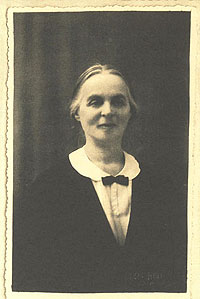
|
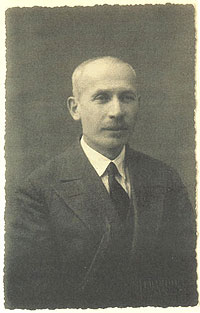
|
|
|
Elka Welbel (1937) |
|
|
Yaakov Welbel (ca. 1942) |
|
|
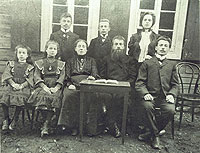
|
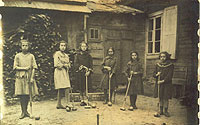
|
|
|
The Welbel Family (1905) |
|
|
At the courtyard of Berachowicz's residence (1922) |
|
|
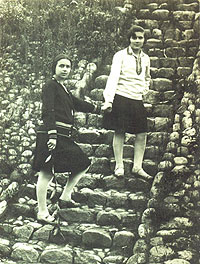
|
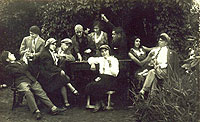
|
|
|
The steps leading to the bridge over
the Niemen River (ca. 1927)
Miriam (Welbel) Rutenberg (lower stair)
& her friend Frida
Sukenik of Bialystok |
|
|
Miriam (Welbel) Rutenberg
with her friends (ca. 1928) |
|
|
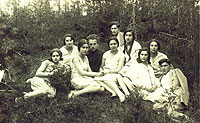
|
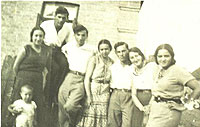
|
|
|
Miriam & her friends
at Zaleski Forest
(ca. 1928) |
|
|
Miriam with friends (ca. 1930) |
|
|
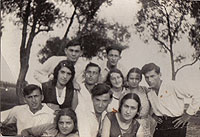
|
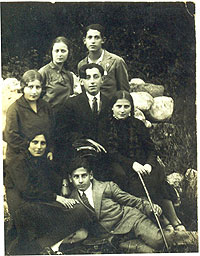
|
|
|
Miriam with her friends (ca. 1930) |
|
|
Liza (Welbel) Shwetz & friends
(summer holidays 1930) |
|
|
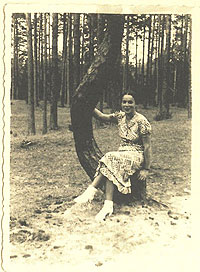
|
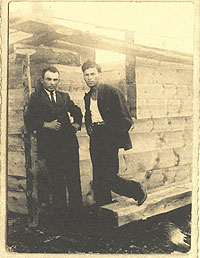
|
|
|
Rachel (Welbel) Kuperfenig (1935) |
|
|
Mordechai ("Motke") Kuperfenig (left) &
his younger
brother Feivush (ca. 1928) |
|
|
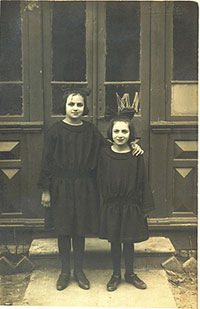
|
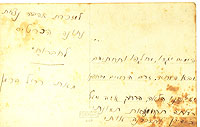
|
|
|
Rachel Berman (left) & her sister
granddaughters of Mordechai Kosowski from Lunna (ca. 1930)
perished in the Holocaust |
|
|
Back of the photograph |
|
Eisenshmidt Family
|
Shalom and
Yocheved Eisenshmidt resided in the small village of Anosowse
located about sixteen kilometers southwest of Lunna. Shalom (b. 1864) was a
farmer. He and Yocheved had seven children, all born in Anosowse. One
son and one daughter died from tuberculosis in childhood. The
remaining children were Yehoshua-Ovsey (b. 1896), Rachel (b. 1898), Raica (b.
1902), and Henie and Tzvi (b. 1908). Yehoshua-Ovsey married Ester Welbel
from Lunna and lived there. Rachel married Meir Friedman from
Lunna; they moved to Lunna and owned a restaurant. Raice married Tzvi
Levin and settled in Berestovitz. Henie married Abraham Langer
and they, too, settled in Berestovitz. Tzvi married Frida Rochkin from Lunna
and was a farmer in Anosowse.
Shalom Eisenshmidt died in Lunna on the 21st of Nissan 5694 (1934) and
was buried in the Lunna cemetery. His wife Yocheved, his son Tzvi and
his family then moved to Lunna; Tzvi Eisenshmidt became a merchant in
Lunna.
Yehoshua-Ovsey and Ester Eisenshmidt and their sons Abraham (b. 1925)
and Yaakov (b. 1927), Rachel and Meir Friedman, Raice and Tzvi Levin,
Henie and Avraham Langer, Tzvi and Frida Eisenshmidt perished in the
Holocaust.
|
From the Collection of Eliezer Eisenshmidt
|
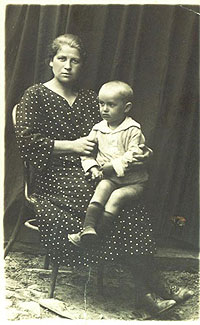
|
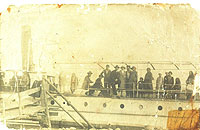
|
|
|
Ester (Welbel) Eisenshmidt & her son
Eliezer (Cherlona, 1922) |
|
|
A steam boat ("Parachod") on the Niemen
going from Lunna to Grodno (ca. 1925) |
|
|
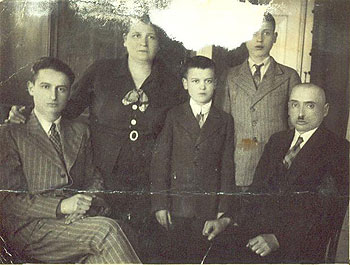
|
|
|
The Eisenshmidt Family (ca. 1938) |
|
Below is a letter sent by Eliezer Eisenshmidt to his cousin Miriam (Welbel)
Rutenberg, dated Dec. 12, 1945, and the Miriam's spontaneous response
which she did not send to Eliezer but was written for herself and was kept
in one of her folders. The letter and the response are published in
the booklet "Our Miriam is 90 years old" (in Hebrew, Oct. 2000).
Letter (written in Yiddish) sent by Eliezer Eisenshmidt from Bitom,
Poland, to his cousin Miriam (Welbel) Rutenberg in Eretz Israel
Bitom, Dec. 12. 1945
My dear cousin Miriam,
…It is hard to describe how happy I was to receive your letter dated
Oct. 20, 1945. My dear cousin, you can imagine that it is not so easy
and it can take several months to write about all that. Our parents
were murdered on the first of Tevet, 1942 in the Auschwitz
extermination camp. Your father, my parents and all our relatives were
taken together. On that day they were all murdered in the gas chamber
and their bodies were burnt in the crematoria. Rachel and Motke
[Miriam's sister and her husband] arrived a little later to Auschwitz.
Rachel perished on the 17th of Adar, 1943. Motke stayed in the camp
for quite a long time and died in the summer of 1944.
My father, my mother and Yaakov [Eliezer's youngest brother] were
murdered immediately upon arrival to the Auschwitz camp. Abraham [Eliezer's
second brother] stayed in the camp 6 weeks and he then died from
blood-poisoning.
The fate of Uncle Nochum-Moshe's family and of Uncle Yosef's family
was the same. They perished together with all the Jews of Lunna.
You have asked how such a miracle happened to me — I myself do not
understand it. I suppose it is just a matter of fate. I believe that
when we meet, I will tell you about it in more detail.
Miriam — I don't need anything. I am working and earning enough for
myself and for my wife. Now, I would like to tell you that three
months ago I got married to Yehudit from Sosnowicz.
Please pass on my regards to Liza and her husband…
…
Your faithful cousin,
Eliezer
The Spontaneous Response of Miriam Rutenberg to Eliezer's Letter
I have received Eliezer's letter.
I read it and felt paralyzed. I could not cry. I don't know why — is
there nothing anymore to cry about? The dates at when father, Rachel
and Motke and other relatives were sent to the gas chambers are
indicated in this letter. My head weighs hard on me as if it were
filled with lead. My mind and thought are hardly working. Father, with
his energy, consistently taking the initiative and having so much
wisdom — there was nothing hard for him and he did everything for his
family as well as for other people. Father was taken in a crowded
freight carriage with no air to breath. Father was pushed into the gas
chamber and asphyxiated, and then his body was burned in the
crematorium and his ashes spread in the wind.
Rachel, Oh my sister Rachel. We loved you so much for your kindness
and your good heart, your good nature. They made you work in hard
labor and only after they exploited you beyond your power, they sent
you to the gas chamber. They certainly cut your hair, your long hair
in order to make mattress for a cursed German woman, and you still did
not believe but hoped that maybe water would flow from the shower and
not poison. Your eyes must have become bigger from fear and shyness
while you were rushing around within the chamber when the gas began to
suffocate you. You ran naked from corner to corner since it looked as
if in the other corner there was more air to breathe. Oh, what a
terrible sight.
And you Motke, we always praised you for being an active man, full of
energy, who knows how to manage any situation. You too, didn't you
catch their fraud but believed that they would take you to work and
would feed you with bread? One and a half years they exploited you and
when you could not bring them anymore profit, they sent you to the gas
chamber.
God of vengeance, avenge! Avenge the vengeance of our parents, of the
brothers and the sisters, the children and the babies! Avenge the
vengeance of your people!
|
אל נקמות נקום! נקום את נקמת ההורים, האחים והאחיות, הילדים והתינוקות!
נקום נקמת עמך! |
Translated into English by Ruth Marcus
This site is hosted at no cost by JewishGen, Inc., the Home of Jewish
Genealogy. If you have been aided in your research by this site and
wish to further our mission of preserving our history for future
generations, your
JewishGen-erosity is greatly appreciated.
|
Compiled by
Ruth Marcus & Aliza Yonovsky Created
May 2007
Updated by rLb, March 2020
Copyright © 2007 Ruth Marcus
All the photos are presented
by courtesy of the families and are not allowed to be reproduced
without their permission. |
|
|